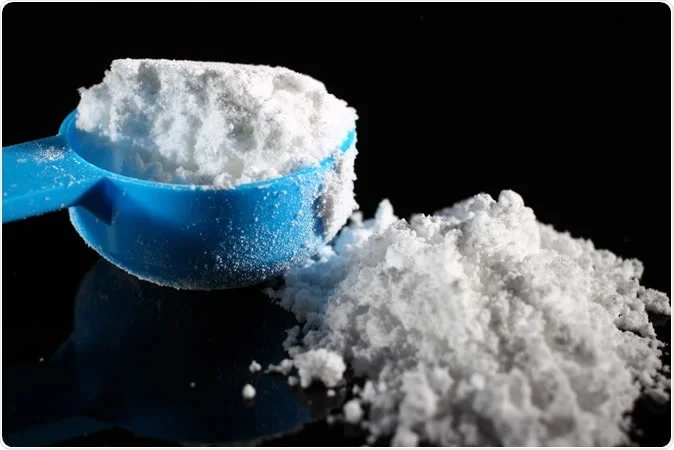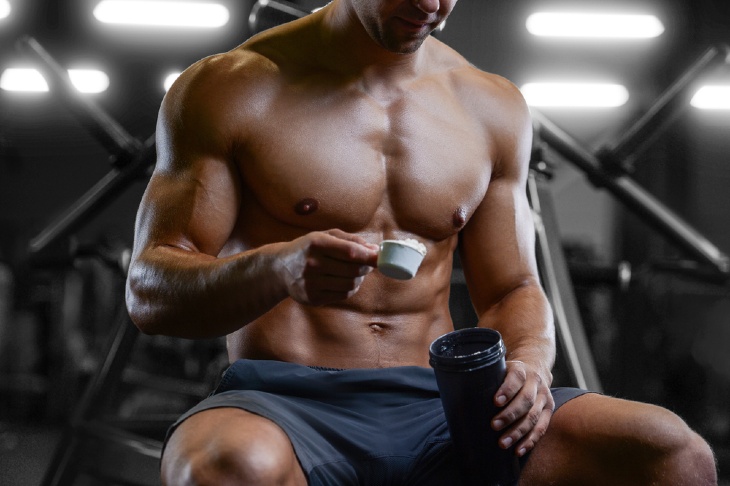Does Creatine Help Muscle Growth?
Many athletes, bodybuilders, and health professionals rely not only on healthy diets and exercises to make a fit body but also rely on pre-workout and post-workout supplement drinks, pills, and mixes for additional benefits.
One of the most natural supplements for enhancing performance, stamina, and energy is the ingredient, Creatine.
You can find Creatine in the form of pills, powder, energy bars in any drug store, online stores, nutrition stores, and supermarkets without any doctor’s prescription.
There are not many pieces of evidence to prove the effectiveness of Creatine, but people who take Creatine for muscle growth every day claim that it really improves their endurance, strength, and muscle built.
What is Creatine?
Creatine is an organic compound that you can find in the body’s energy currency in the cell that recycles your brain and muscle tissues. In the early 1900s, Harvard University published a study stating that consuming Creatine can boost the Creatine content of the body’s muscles.
By 1992, it was reported by the Times, Britain, that many Olympic players ingest Creatine before participating in the Olympics.
This publication boosted the demand for Creatine in the market and eventually becoming a popular ingredient in many pre-workout and post-workout supplements.

Does Creatine Help Muscle Growth?
Yes, Creatine helps Muscle growth. You can safely consume Creatine for muscle growth. The benefits of Creatine for your body are:
It helps you gain muscle
Creatine aids in increasing your lean mass and strength by powering up your training for resistance. Not only that, health experts verify that amongst all muscle-building supplements, Creatine is the best ingredient for building up the muscular cells in your body.
An independent study conducted on around 20 males who ingested Creatine daily for building up muscle growth proved that after three days of intense training per week for eight weeks, increasing their muscle growth increased faster than those who did not ingest Creatine for muscle growth.
Also, Creatine is very effective in women who face pre and post-menopausal syndromes, postpartum, and Pre Menstrual Syndromes.
It is suggested that Creatine works more effectively on women because of the different energetic movements in the brain compared to men. But, in both men and women, Creatine can work effectively when you combine with weight training.
It improves your strength and energy
Adenosine Triphosphate or ATP energy is the primary molecule that breaks all food molecules in your body to give you energy.
It also gives you the energy that you need while performing heavy exercises and training. When you consume Creatine, the Adenosine Triphosphate or ATP energy increases its energy production giving you more energy than before, and also recycles previously stored ATP in your body.
Within half an hour of consuming Creatine, the ATP levels increase in your body by 5% more, thus resulting in improving your strength for better endurance. It will also help reduce your muscle sores and pain after intense workouts.
It strengthens your brain
As mentioned, Creatine works on the brain’s energetic movement more in women than men, but this doesn’t mean that it doesn’t work on men.
It’s just that it works a little less efficiently than men but still works, though. Natural Creatine resides not only in the muscles but also in the brains and testes.
That is why your stored ATP energy gets recycled upon consumption of more Creatine, resulting in increased mental achievement.
The concentration levels of your brain improve by the supplementation of Creatine, making you perform well not only in the gym but also boosting your memory and concentration skills.
It improves your testosterone level
Since ATP energy is stored in your testes, ingestion of Creatine for muscle growth not only boosts your muscles but also enhances your sex drive.
This ATP energy is beneficial for people who pass the age of thirty since men tend to lose their sex drive by the time they reach this age.
People who took Creatine for a period of more than two months claim that they noticed an increase in their sex drive and improved their sexual wellness.

How to take Creatine?
It is advisable to take Creatine with a dosage of 20 grams four times a day. It is best to consume your Creatine supplement along with proteins and carbohydrates, making your body respond well to Creatine. After a period of 10 days, you can slowly lower the dosage until you are consuming 5 grams per day.
Health experts recommend that you can also derive Creatine naturally from animal tissues like all kinds of red meat and fish like salmon.
It may be challenging to get Creatine for Vegans and Vegetarians since Creatine is not available in any plant-based diet, so you may have to consume Creatine for muscle growth from supplements like pills, powders, or bars.
Side Effects and Interactions of Creatine
While there are no significant side effects of Creatine, it is still advisable to consume Creatine in the recommended amounts. Discontinue its use, if you get:
- Diarrhea
- Dizziness
- High Blood Pressure
- Muscle Cramps
- Stomach discomforts
One of the first side effects of consuming Creatine can be weight gain of the body within a week. But, you can control it if you intend to train at the gym.
It is not advisable for children below 18 years of age, people who have kidney ailments, underlying heart and nerve conditions, pregnant and lactating women.
Also, Creatine for muscle growth can interact with drugs like Ibuprofen, Furosemide, or Probenicid.
While Creatine for muscle growth may give you the best results, it is advisable to train yourself and work hard at the gym for better results. After all, it is sold to aid you in better muscle growth, endurance, and athletic performance.
Also, Creatine for muscle growth is perfectly safe for vegans and vegetarians since the raw materials for producing Creatine do not contain any sort of animal products.
Some people may also not respond well to Creatine, but those who do will see a significant change in the growth of their muscles.




